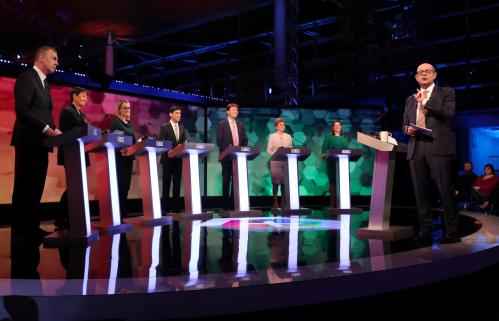Content from the Brookings Institution India Center is now archived. After seven years of an impactful partnership, as of September 11, 2020, Brookings India is now the Centre for Social and Economic Progress, an independent public policy institution based in India.
In the aftermath of the United Kingdom’s vote to leave the European Union, we are left with more questions than answers. Dhruva Jaishankar writes that with all the questions about what happens next, there’s a bigger question worth asking: What are the implications of Brexit for democracy? Arguably, Brexit represents the first major casualty of the ascent of digital democracy over representative democracy. This piece was originally posted by The Huffington Post.
In the aftermath of the United Kingdom’s vote to leave the European Union, we are left with more questions than answers. What kind of relationship will the UK now forge with the EU, and how will that affect economic relations and migration? Will Scotland and Northern Ireland opt to leave? What is the future of British politics, given turbulence within both the Conservative and Labour Parties? Will a successful Brexit set a precedent for other EU members — perhaps even some eurozone members— to leave the union? What are the long-term economic consequences of the resulting uncertainty? Will Brexit even happen at all, given the absence of a clear post-referendum plan, the apparent unwillingness of ‘Leave’ campaign leaders to invoke Article 50 of the Lisbon Treaty, and the fact that the referendum was advisory and non-binding? Answers to these questions will make themselves evident in the coming weeks, months, and years.
[D]igital democracy… has contributed to polarization, gridlock, dissatisfaction and misinformation.
But there’s a bigger question worth asking: What are the implications of Brexit for democracy? Arguably, Brexit represents the first major casualty of the ascent of digital democracy over representative democracy. This claim deserves an explanation.
When historians look back at the world of the past 25 years, they will likely associate it not with terrorism or growing inequality but with the twin phenomena of the “rise of the rest” (particularly China and India) and of globalization. Globalization involves the easier, faster and cheaper flow of goods, people, capital and information. One big enabler of globalization is the internet, the global network of networks that allows billions of people to cheaply and easily access enormous amounts of digital information. The rise of service and high-technology industries, trade liberalization, container shipping, and the development of financial markets have also been important enablers, as is the increased ease and lower cost of travel, particularly by air.
Many technology optimists have assumed that globalization would lead to the democratization of information and decision-making, and also greater cosmopolitanism. Citizens would be better informed, less likely to be silenced, and able to communicate their views more effectively to their leaders. They would also have greater empathy and understanding of other peoples the more they lived next to them, visited their countries, read their news, communicated, and did business with them. Or so the thinking went.
[L]eaders only exploit the vulnerabilities of a post-fact world. The conditions have been laid by the digital sphere.
But there has been little to justify such panglossianism. There is some evidence for a correlation between greater information, political democratization and economic progress, in that all three have advanced steadily, if at different paces, over the past two decades. But that correlation is weak. Instead, digital democracy — the ability to receive information in almost real time through mass media and to make one’s voice heard through social media — has contributed to polarization, gridlock, dissatisfaction and misinformation. This is as equally applicable to the countries in which modern democracy took root — in the United States and Europe — as it is to India, the biggest and most complex democracy in the developing world.
The ascent of digital democracy around the world has some shared features. One characteristic is that access to greater information has, rather counterintuitively, contributed to a “post-fact” information environment. Nick Cohen — speaking of British pro-“Leave” journalists-turned-politicians Boris Johnson and Michael Gove —called out their use of bold claims, their contempt for practical questions, their sneering disregard for expertise, and their transgressions of the bounds of political spin. These tactics are not all that dissimilar to Donald Trump’s assertions about Barack Obama’s birth certificate or immigration policies, or Subramanian Swamy’s insinuations about the nationality of senior Indian policymakers.
But leaders only exploit the vulnerabilities of a post-fact world. The conditions have been laid by the digital sphere. A recent example springs to mind. There is a widespread belief on Indian social media that US presidential candidate Hillary Clinton is somehow anti-India, pro-Pakistan, and/or anti-Modi. I am no supporter of Ms. Clinton, but as someone who worked on foreign affairs in Washington and knows many of her advisors, I found these claims baffling. In fact, Clinton’s political opponents (whether Barack Obama in 2008 or Donald Trump in 2016) have accused her of being too close to India, while Pakistanis often view her as critical of their country and Prime Minister Modi appears to enjoy cordial relations with her. After some inquiries, and a few tips, I managed to trace these sentiments to a single publication, a poorly sourced and misleading column that gained widespread circulation upon its release. The article’s contents were deemed sufficiently credible to have now become instilled as absolute fact in the minds of many Indians active online. In a digital democracy, a lie or (better yet) a half-lie if told enough times becomes truth.
In a digital democracy, a lie or (better yet) a half-lie if told enough times becomes truth.
Another outcome of digital democracy may be a variation of what the psychologist Barry Schwartz has called the paradox of choice. Quite possibly, the greater abundance of political choice leads to less satisfaction, and the result is citizens increasingly voicing their displeasure with their available political and policy choices. The political platforms of mainstream parties rarely adhere entirely to individual voters’ views. That may explain why many voters are gravitating towards parties, factions or leaders who offer the simplest messages, and project themselves as alternatives to the mainstream.
A third result of digital democracy, and one that has been better documented, is the political echo chamber. Social media, rather than creating connections with people who possess differing views and ideologies, tends to reinforce prejudices. As the psychologist Nicholas DiFonzo has noted, “Americans across the political spectrum tend to trust the news media (and ‘facts’ provided by the media) less than their own social group.” This makes it easier for views and rumours to circulate and intensify within like-minded groups. Similar digital gerrymandering was evident in the EU Referendum in Britain and the polarization is palpable in the Indian online political space.
Finally, instant information has increased the theatricality of politics. With public statements and positions by governments, political parties and individual leaders now broadcast to constituents in real time, compromise, a necessary basis of good governance, has become more difficult. When portrayed as a betrayal of core beliefs, compromise often amounts to political suicide. Political grandstanding also contributes to legislative gridlock, with elected representatives often resorting to walkouts, sit-ins, or insults — all manufactured for maximum viral effect — instead of trying to reach solutions behind closed doors. Even as ease of travel allows legislators to spend more time in their constituencies, making them more sensitized to their constituents’ concerns, less gets done at the national or supranational level. It is a trend that, once again, applies equally to the United States, Europe, and India.
Social media, rather than creating connections with people who possess differing views and ideologies, tends to reinforce prejudices.
The unintended consequences of digital democracy — misinformation and discontent, polarization and gridlock — mean that the boundary between politician and troll is blurring. The tone of democratic politics increasingly reflects that of anonymous online discourse: nasty, brutish, and short. And successful politicians are increasingly those who are able to take advantage of the resulting sentiments. Exploiting divisions, appealing to base instincts, making outlandish claims, resorting to falsehoods, and pooh-poohing details and expertise. All that could just as easily describe the playbooks of populists around the world, on the right and left: Marine Le Pen, Frauke Petry, Donald Trump or Subramanian Swamy as much as Jeremy Corbyn, Beppe Grillo, Bernie Sanders or Arvind Kejriwal.
The unintended consequences of digital democracy — misinformation and discontent, polarization and gridlock — mean that the boundary between politician and troll is blurring.
In all these cases, populists are willing to cross the lines that mainstream parties have flirted with, becoming forces that the centre cannot hold. US Republicans fanned the anti-immigration sentiments that first the Tea Party and then Trump are only taking to their natural conclusions, just as mainstream Democrats’ economic protectionism has been seized upon by Sanders. Cameron’s euroscepticism, explained away initially as constructive criticism, spiralled out of control with Brexit, just as those who pronounced the death of New Labour helped paved the way for Corbyn. Will the same one day apply in India, to the economic populism of the Congress, of which Kejriwal has become a new torchbearer, or to the chauvinism of the right, which Swamy now threatens to run away with?
Brexit is not anti-globalization so much as a product of globalization. It is also a product of democracy rather than an affront to it. But it is a democracy of a different sort, one that many of its ideological forebears anticipated. When James Madison warned of “the superior force of an interested and overbearing majority,” or John Stuart Mill cautioned against “a social tyranny more formidable than many kinds of political oppression,” or BR Ambedkar argued (in a slightly different context) that “political tyranny is nothing compared to social tyranny,” they could just as easily have been speaking in 2016 as in 1787, 1859, or 1936. Democrats around the world may not yet be married to the mob, but plenty have been betrothed.
None of this should be interpreted as some kind of nostalgia for an older, simpler world. That world was not necessarily simpler, but it was more violent and chaotic, prejudiced and unfair, and poor and backward. It may be hard to discern amid the smoke and noise, but there are some benefits to digital democracy. Information is no longer in the hands of the few. It is easier than ever to bring injustices to light. And the same process can throw up mainstream leaders from backgrounds that are far from privileged, such as a Barack Obama, Angela Merkel, or Narendra Modi. Two of the three, Obama and Modi, rose to power on the backs of unprecedented social media movements.
But representative democracy as we have come to know it is under threat, and Brexit represents the first major casualty. Rather than fight the tide, a collective rethink is needed about how to make democracies resilient and productive in the digital age. It won’t be easy.
The Brookings Institution is committed to quality, independence, and impact.
We are supported by a diverse array of funders. In line with our values and policies, each Brookings publication represents the sole views of its author(s).








Commentary
Brexit: The first major casualty of digital democracy
June 29, 2016